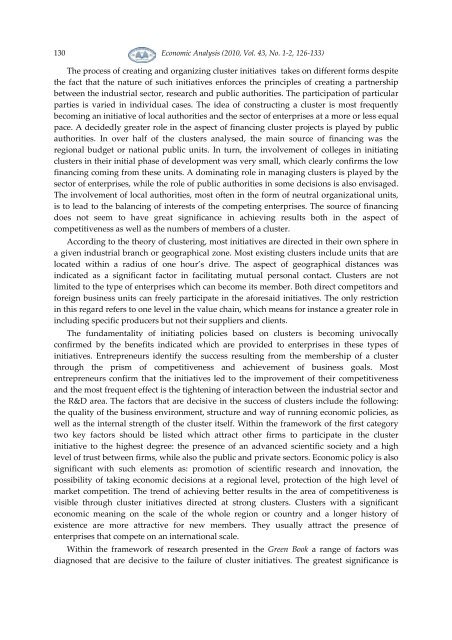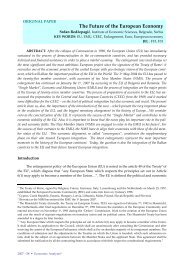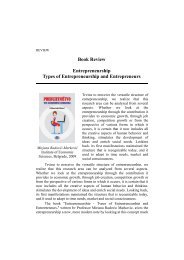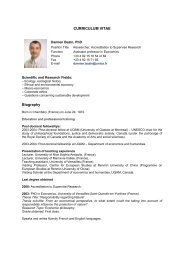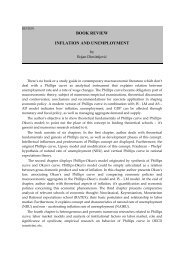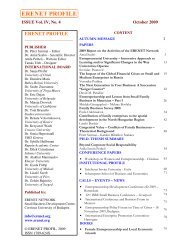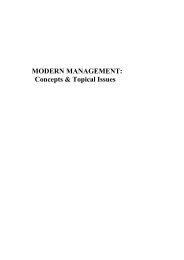Twice a Year Scientific Journal
Twice a Year Scientific Journal
Twice a Year Scientific Journal
Create successful ePaper yourself
Turn your PDF publications into a flip-book with our unique Google optimized e-Paper software.
130<br />
Economic Analysis (2010, Vol. 43, No. 1-2, 126-133)<br />
The process of creating and organizing cluster initiatives takes on different forms despite<br />
the fact that the nature of such initiatives enforces the principles of creating a partnership<br />
between the industrial sector, research and public authorities. The participation of particular<br />
parties is varied in individual cases. The idea of constructing a cluster is most frequently<br />
becoming an initiative of local authorities and the sector of enterprises at a more or less equal<br />
pace. A decidedly greater role in the aspect of financing cluster projects is played by public<br />
authorities. In over half of the clusters analysed, the main source of financing was the<br />
regional budget or national public units. In turn, the involvement of colleges in initiating<br />
clusters in their initial phase of development was very small, which clearly confirms the low<br />
financing coming from these units. A dominating role in managing clusters is played by the<br />
sector of enterprises, while the role of public authorities in some decisions is also envisaged.<br />
The involvement of local authorities, most often in the form of neutral organizational units,<br />
is to lead to the balancing of interests of the competing enterprises. The source of financing<br />
does not seem to have great significance in achieving results both in the aspect of<br />
competitiveness as well as the numbers of members of a cluster.<br />
According to the theory of clustering, most initiatives are directed in their own sphere in<br />
a given industrial branch or geographical zone. Most existing clusters include units that are<br />
located within a radius of one hour’s drive. The aspect of geographical distances was<br />
indicated as a significant factor in facilitating mutual personal contact. Clusters are not<br />
limited to the type of enterprises which can become its member. Both direct competitors and<br />
foreign business units can freely participate in the aforesaid initiatives. The only restriction<br />
in this regard refers to one level in the value chain, which means for instance a greater role in<br />
including specific producers but not their suppliers and clients.<br />
The fundamentality of initiating policies based on clusters is becoming univocally<br />
confirmed by the benefits indicated which are provided to enterprises in these types of<br />
initiatives. Entrepreneurs identify the success resulting from the membership of a cluster<br />
through the prism of competitiveness and achievement of business goals. Most<br />
entrepreneurs confirm that the initiatives led to the improvement of their competitiveness<br />
and the most frequent effect is the tightening of interaction between the industrial sector and<br />
the R&D area. The factors that are decisive in the success of clusters include the following:<br />
the quality of the business environment, structure and way of running economic policies, as<br />
well as the internal strength of the cluster itself. Within the framework of the first category<br />
two key factors should be listed which attract other firms to participate in the cluster<br />
initiative to the highest degree: the presence of an advanced scientific society and a high<br />
level of trust between firms, while also the public and private sectors. Economic policy is also<br />
significant with such elements as: promotion of scientific research and innovation, the<br />
possibility of taking economic decisions at a regional level, protection of the high level of<br />
market competition. The trend of achieving better results in the area of competitiveness is<br />
visible through cluster initiatives directed at strong clusters. Clusters with a significant<br />
economic meaning on the scale of the whole region or country and a longer history of<br />
existence are more attractive for new members. They usually attract the presence of<br />
enterprises that compete on an international scale.<br />
Within the framework of research presented in the Green Book a range of factors was<br />
diagnosed that are decisive to the failure of cluster initiatives. The greatest significance is


